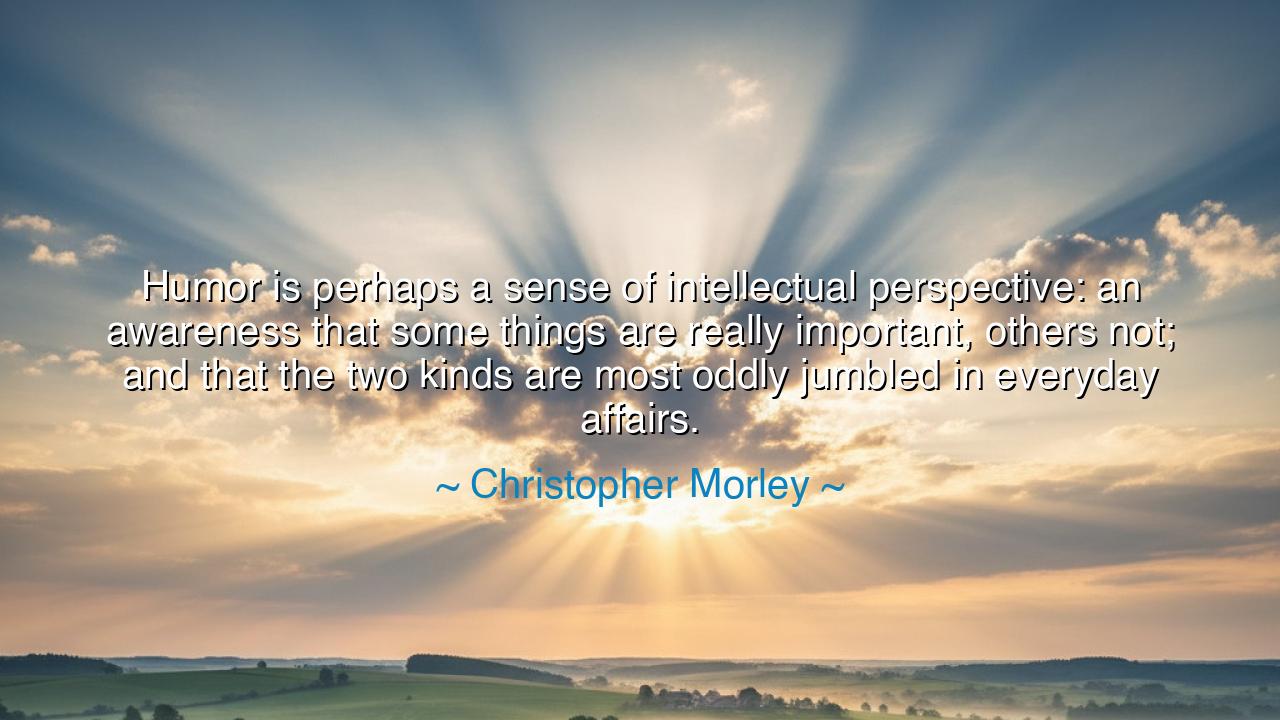
Humor is perhaps a sense of intellectual perspective: an
Humor is perhaps a sense of intellectual perspective: an awareness that some things are really important, others not; and that the two kinds are most oddly jumbled in everyday affairs.






In the quiet wisdom of reflection, Christopher Morley, the poet, essayist, and keen observer of human nature, wrote these words that gleam like a polished truth: “Humor is perhaps a sense of intellectual perspective: an awareness that some things are really important, others not; and that the two kinds are most oddly jumbled in everyday affairs.” Within this thought lies not mere wit, but the essence of human sanity — the balance between seriousness and serenity, between intellect and humility. For humor, as Morley teaches, is not the denial of importance, but the understanding of proportion. It is the mind’s way of seeing life clearly, without being crushed by its weight.
Morley, who lived in the first half of the twentieth century, wrote during a time of transformation — between wars, in an age of invention, when progress and tragedy intertwined. His reflections were born from a mind both literary and philosophical, one that observed how people often lose sight of what truly matters. He saw that humor — that quiet, knowing laughter — was not an escape from thought, but a deeper form of it. For when one can smile at life’s chaos, one has already begun to understand it. Humor, in Morley’s eyes, is intellectual perspective: the ability to discern the grand from the trivial, the eternal from the fleeting, and yet recognize that both dwell together in the same fragile vessel called life.
This awareness of proportion is what gives humor its nobility. It teaches us that the universe is vast, and our troubles, though sharp, are but small ripples upon its surface. The one who can laugh wisely is the one who has found peace in imperfection. Humor, then, is not foolishness — it is wisdom wearing a smile. It is the philosopher’s calm gaze upon the storm, the poet’s laughter in the face of despair, the hero’s lightness before the impossible. It says, “Yes, the world is broken — and still, it is beautiful.” Through humor, the intellect learns mercy, and the heart learns resilience.
History offers many who understood this truth. Consider Abraham Lincoln, whose humor softened the blows of war and leadership. When the Civil War’s burdens grew unbearable, Lincoln told stories that made even his weary generals laugh. He did not laugh because life was easy; he laughed because he saw life whole. In his eyes, tragedy and comedy were not enemies but twins — both born of the same human struggle. His humor gave him distance, a perspective that kept him sane amidst sorrow. As Morley might have said, Lincoln knew what was important — justice, unity, compassion — and what was not — vanity, pride, or despair. And in that clarity, laughter became strength.
Humor, in Morley’s sense, is the mind’s safeguard against madness. It allows us to live among contradictions without being consumed by them. Life is indeed “oddly jumbled,” as he writes — joy and grief, triumph and failure, sacred and ridiculous, all bound together in the same day. To live without humor is to drown in this confusion; to live with it is to dance through it. The one who can laugh wisely has already conquered fear, for laughter turns what is unbearable into something bearable, what is absurd into something understood.
There is also humility in this teaching. To laugh at oneself is to know one’s place in the grand design — small, imperfect, but still worthy. The ancients taught that self-knowledge is the beginning of wisdom, and humor is its companion. It reveals our folly gently, without cruelty, and reminds us that even our errors have a kind of grace. When we can see our mistakes and smile, we show that we have learned their lesson. The proud may break under truth, but the humble laugh and grow stronger.
So, take this wisdom as your own: let humor be your compass in the chaos of living. When life confuses you with its contradictions — when the serious mingles with the silly, when what matters most hides among the mundane — step back and smile. See the pattern, the play, the strange harmony of the world. Laugh not to escape, but to understand. Laughter, born of perspective, is the mind’s way of bowing to the mystery of existence without surrendering to it.
For in the end, as Christopher Morley reminds us, humor is the mark of the wise — the soul’s proof that it sees the truth and yet chooses joy. To laugh with understanding is to live with freedom; to smile at the world’s oddness is to walk through it unshaken. Cultivate that sacred laughter — the laughter that is not shallow, but serene — and you will find that no storm can take your peace, and no confusion can blind your sight.






AAdministratorAdministrator
Welcome, honored guests. Please leave a comment, we will respond soon